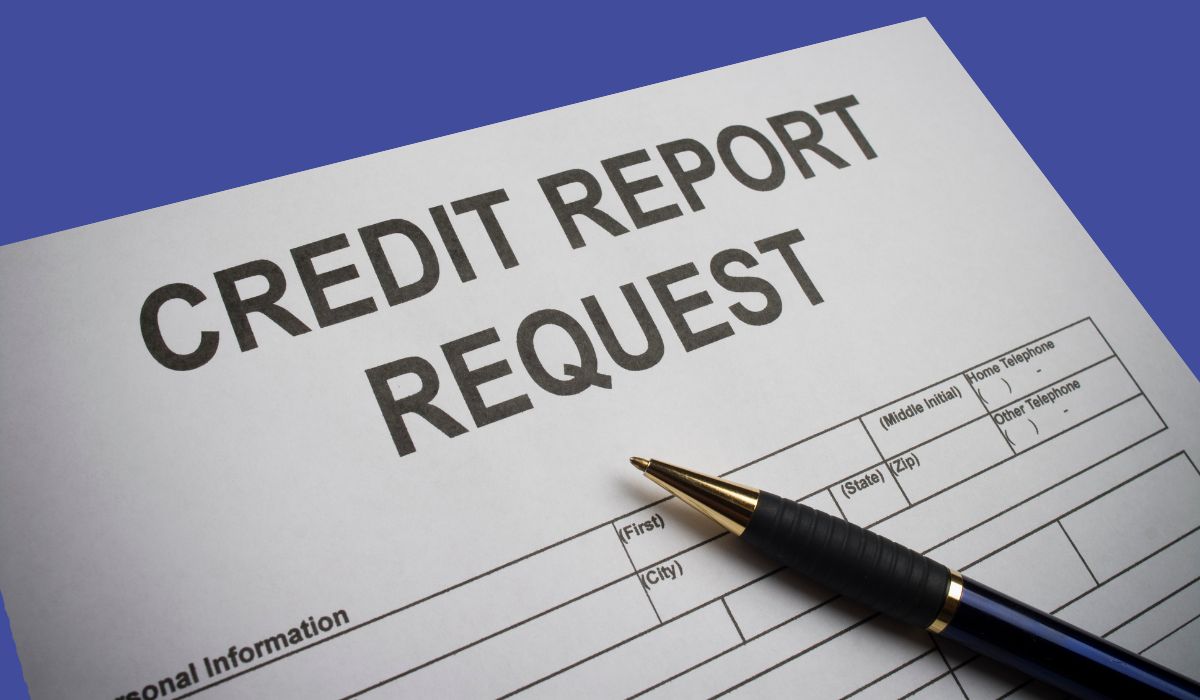

Finance
Who Is Credit Plus On My Credit Report
Modified: January 11, 2024
Find out who Credit Plus is on your credit report and understand how they impact your finances. Learn more about this financial institution and its role in your credit history.
(Many of the links in this article redirect to a specific reviewed product. Your purchase of these products through affiliate links helps to generate commission for LiveWell, at no extra cost. Learn more)
Table of Contents
Introduction
A credit report is a vital document that provides a detailed overview of an individual’s financial history. It includes information such as credit accounts, payment history, and any negative marks such as late payments or defaults. Lenders, landlords, and even employers often rely on credit reports to assess an individual’s creditworthiness and financial responsibility.
When you receive your credit report, you may come across the term “Credit Plus” listed on it. This may raise questions about who or what Credit Plus is and why it is appearing on your credit report. In this article, we will delve into the details of Credit Plus and its impact on your credit score.
Understanding Credit Plus is crucial in order to have a clear picture of your financial history and its implications. We will explore the reasons why Credit Plus appears on your credit report and how it can affect your creditworthiness. Additionally, we will provide insights into how to address any errors or discrepancies related to Credit Plus on your credit report.
So, if you’re puzzled about Credit Plus on your credit report and want to gain a better understanding of its significance, read on to uncover all the pertinent information.
What is a Credit Report?
A credit report is a detailed summary of an individual’s credit history compiled by credit reporting agencies. It serves as a comprehensive record of a person’s financial activities, including credit accounts, loan information, payment history, and public records.
Credit reporting agencies, such as Equifax, Experian, and TransUnion, collect data from various sources like banks, credit card companies, and lenders to compile credit reports. These reports are used by financial institutions, landlords, and other entities to assess an individual’s creditworthiness and financial responsibility.
When you apply for credit, whether it’s a credit card, loan, or mortgage, lenders will request your credit report to evaluate your creditworthiness. They analyze your credit score and the information contained in your credit report to determine whether you pose a high or low risk as a borrower.
Key information that is typically included in a credit report includes:
- Personal information: This includes your name, address, Social Security number, and date of birth.
- Credit accounts: This section lists your credit accounts, such as credit cards, auto loans, and mortgages. It includes details like the account type, balance, payment history, and account status.
- Public records: This section includes information on bankruptcies, tax liens, and civil judgments.
- Inquiries: This lists the companies or individuals who have accessed your credit report for review purposes, such as lenders or landlords.
- Payment history: This section details your payment history for each credit account, indicating whether payments were made on time or if there were any late or missed payments.
Overall, a credit report provides a snapshot of your financial history, helping lenders assess your creditworthiness and make informed decisions about extending credit to you. Regularly reviewing your credit report is important to ensure its accuracy and to identify any errors or fraudulent activity that may impact your creditworthiness.
Understanding Credit Plus
Credit Plus is not a term that refers to a specific entity or company. Instead, “Credit Plus” on your credit report is a general term used to indicate additional credit information reported by lenders or creditors. It typically includes details about your credit accounts that are not part of the traditional credit reporting agencies’ data.
When a lender or creditor reports information about your credit accounts to the credit reporting agencies, they may include additional details that are beyond the standard reporting requirements. These additional details are referred to as “Credit Plus” information.
Credit Plus can include various types of information, such as:
- Rental or lease payments: If you have a history of timely rent payments, a landlord may choose to report this positive payment history to the credit reporting agencies as Credit Plus information.
- Utility bills: Some utility companies, such as electricity, gas, or water providers, may also report your payment history to the credit bureaus, adding to your Credit Plus information.
- Telecommunications accounts: Your payment history for services like mobile phone bills or internet service may also be included as Credit Plus information.
- Alternative credit accounts: If you have accounts with lenders or creditors who do not typically report to the major credit bureaus, such as small local lenders or credit unions, they may choose to report your payment history as Credit Plus information.
It’s important to note that the inclusion of Credit Plus information on your credit report is voluntary and depends on the practices of your lenders or creditors. Not all lenders or creditors report this additional information, and the extent of Credit Plus may vary from person to person.
Having Credit Plus information on your credit report can provide a more comprehensive view of your creditworthiness and financial responsibility. It allows lenders to consider a broader range of your payment behaviors and obligations, potentially impacting their decisions when evaluating your creditworthiness.
Understanding Credit Plus and its presence on your credit report is essential for knowing how this additional information contributes to your overall credit profile. It’s important to review your credit report regularly to ensure that all the Credit Plus information reported is accurate and reflects your true payment history.
Why is Credit Plus on my Credit Report?
Credit Plus appears on your credit report because lenders or creditors have chosen to report additional credit information beyond the standard reporting requirements of the major credit reporting agencies. By including Credit Plus information, lenders can provide a more comprehensive picture of your creditworthiness and financial history.
The inclusion of Credit Plus information can have several benefits:
- More comprehensive credit assessment: Credit Plus allows lenders to consider additional aspects of your financial behavior, such as rental payments or utility bills, that may not be captured by traditional credit reporting agencies. This can provide a more complete and accurate assessment of your creditworthiness.
- Positive impact on creditworthiness: If you have a strong payment history for rental or utility accounts, including this information as Credit Plus can help boost your creditworthiness. It showcases your responsible financial behavior and may lead to better credit opportunities.
- Building credit for newcomers: For individuals with limited credit history, Credit Plus can be particularly valuable. By reporting positive payment behaviors from alternative credit sources or nontraditional lenders, it can help establish a credit profile and demonstrate creditworthiness.
- Alternative credit evaluation: Some people may have accounts with lenders or creditors who do not typically report to the major credit bureaus. Including these accounts as Credit Plus information allows lenders to consider your payment history from these sources and expand their evaluation of your creditworthiness.
It’s worth noting that while Credit Plus information can have a positive impact on your creditworthiness, it can also potentially highlight negative payment behaviors or financial missteps. Late payments or defaults on rental or utility accounts reported in Credit Plus can negatively impact your credit score and make it more challenging to access credit in the future.
Remember, the inclusion of Credit Plus information is voluntary and varies among lenders and creditors. Not all creditors report this additional information, so the presence of Credit Plus on your credit report may vary from person to person.
By understanding why Credit Plus appears on your credit report, you can grasp the significance of this additional information and how it affects your overall creditworthiness. Regularly monitoring your credit report ensures that the Credit Plus information reported is accurate, allowing you to maintain a strong credit profile.
How Does Credit Plus Impact my Credit Score?
Credit Plus information can have both positive and negative impacts on your credit score. The specific effects depend on the nature of the information being reported and how it aligns with your overall credit history.
Positive impacts:
If you have a history of timely payments for rental or utility accounts, reporting this information as Credit Plus can positively impact your credit score. It demonstrates responsible financial behavior and adds to the positive factors considered in credit scoring models. The inclusion of such positive data can potentially improve your creditworthiness and increase your credit score.
For individuals with limited credit history, including Credit Plus information from alternative credit sources or nontraditional lenders can help establish a positive credit profile. It shows that you have been managing credit responsibly and can help establish a foundation for future credit opportunities.
Negative impacts:
On the other hand, if your Credit Plus information includes late payments, defaults, or other negative marks on rental or utility accounts, it can have a negative impact on your credit score. Payment history is a significant factor in credit scoring models, so any negative information reported as Credit Plus can lower your credit score and make it more difficult to obtain credit in the future.
It’s important to note that the impact of Credit Plus on your credit score is influenced by the scoring model used by lenders. Each credit scoring model may consider and weigh Credit Plus information differently, so the impact can vary. However, since payment history is a common factor in credit scoring, both positive and negative payment behaviors reported as Credit Plus can significantly influence your credit score.
Therefore, it’s crucial to consistently maintain a pattern of responsible financial behavior, ensuring that your payment history, both for traditional credit accounts and Credit Plus information, remains positive. Timely payments, managing credit responsibly, and avoiding any negative marks are key to maintaining a healthy credit score.
Regularly monitoring your credit report allows you to stay informed about any Credit Plus information being reported and ensure its accuracy. By staying proactive and attentive to your credit profile, you can minimize any negative impacts and maximize the positive effects of Credit Plus on your credit score.
How to Fix Errors on your Credit Report Related to Credit Plus
If you encounter any errors or discrepancies related to Credit Plus on your credit report, it’s essential to take immediate action to rectify them. Incorrect or inaccurate information can negatively impact your creditworthiness and potentially hinder your access to credit opportunities. Here are steps you can take to fix errors on your credit report related to Credit Plus:
1. Review your credit report: Obtain a copy of your credit report from reputable credit reporting agencies. Carefully examine the Credit Plus information and cross-reference it with your own records to identify any errors or discrepancies.
2. Document the errors: Make note of the specific errors you have found in the Credit Plus section of your credit report. Include details such as the date, account type, and any supporting documentation you have to prove the inaccuracies.
3. Contact the credit reporting agency: Reach out to the credit reporting agency (or agencies) that provided the credit report displaying the errors. Write a formal letter, including the identified errors and supporting documents, and request that they investigate and correct the information. Be sure to keep copies of all correspondence for your records.
4. Contact the creditor or lender: If the error is related to inaccurate reporting by a specific creditor or lender, reach out to them directly. Provide them with the details of the error and request that they update or correct the information they reported to the credit reporting agency.
5. File a dispute: If the credit reporting agency does not address or resolve the errors, or if the creditor or lender does not correct the information, you can file a formal dispute. Submit a dispute letter to the credit reporting agency, stating the specific errors and providing any additional evidence or documentation to support your claim.
6. Follow up regularly: Stay proactive in pursuing the resolution of the errors on your credit report. Follow up with both the credit reporting agency and the creditor or lender to ensure the corrections are made. Keep track of all communications and any updates or changes to your credit report.
7. Seek legal assistance if needed: In more complex cases, it may be necessary to seek legal assistance from a consumer rights attorney or credit repair agency. They can guide you through the dispute process and take legal action if necessary.
Remember, it’s important to be patient during the resolution process, as it may take some time for the errors to be investigated and corrected. Regularly monitor your credit report to ensure that the corrections have been made and that your creditworthiness is accurately reflected.
Steps to Remove Credit Plus from your Credit Report
If you want to remove Credit Plus information from your credit report, there are several steps you can take to address this issue. Keep in mind that the process may vary depending on the specific circumstances and the credit reporting agency involved.
1. Review your credit report: Obtain a copy of your credit report from one or more of the major credit reporting agencies. Take note of the Credit Plus information that you wish to remove.
2. Identify the source: Determine which lender or creditor is reporting the Credit Plus information. This may require contacting the credit reporting agency or directly reaching out to your lenders to inquire about which accounts are being reported as Credit Plus.
3. Verify the accuracy: Ensure that the Credit Plus information being reported is accurate. Review your records and cross-reference them with the information on your credit report. If you find any discrepancies or errors, proceed to the next step.
4. Dispute the information: File a dispute with the credit reporting agency that is reporting the Credit Plus information. You can do this by submitting a written dispute letter detailing the inaccuracies and providing any supporting documentation. Be clear about your request to remove the Credit Plus information from your credit report.
5. Contact the source directly: Reach out to the lender or creditor that is reporting the Credit Plus information. Explain the situation and request that they stop reporting it to the credit reporting agency or correct any inaccuracies. Make sure to document your communication with the lender or creditor for future reference.
6. Follow up regularly: Stay proactive in following up with the credit reporting agency and the source of the Credit Plus information. Keep track of all correspondence, including dates and details of any conversations or agreements made regarding the removal of the Credit Plus information from your credit report.
7. Monitor your credit report: Regularly check your credit report to ensure that the Credit Plus information has been removed or updated accordingly. It may take some time for the changes to be reflected in your credit report, so be patient and persistent in monitoring its progress.
8. Seek legal assistance if needed: If you encounter difficulties in removing the Credit Plus information or if you believe your rights have been violated, you may consider seeking legal advice from a consumer rights attorney or credit repair agency. They can guide you through the process and provide additional support.
Remember that removing Credit Plus information from your credit report may not always be possible or necessary. If the reported information is accurate and portrays a positive credit history, it may benefit your creditworthiness. However, if you believe the information is inaccurate or misleading, it’s essential to take the appropriate steps to address the situation and ensure the accuracy of your credit report.
Conclusion
Understanding Credit Plus and its presence on your credit report is crucial for managing your financial health. While it may initially raise questions or concerns, Credit Plus represents additional credit information reported by lenders or creditors that can provide a more comprehensive view of your creditworthiness and financial history.
By reviewing your credit report regularly, you can ensure the accuracy of the Credit Plus information being reported. If you encounter any errors or inaccuracies, it’s important to take immediate action to rectify them. Utilize the steps outlined in this article to address any discrepancies and work towards maintaining a strong and accurate credit profile.
Remember that Credit Plus information can have both positive and negative impacts on your credit score. Timely payments and responsible financial behavior reflected in Credit Plus can improve your creditworthiness. However, any negative marks or late payments reported as Credit Plus can negatively impact your credit score, making it vital to remain vigilant and address any issues promptly.
Ultimately, staying informed and proactive in managing your credit report is essential. Regularly monitor your credit report, communicate with the credit reporting agencies and creditors, and take necessary steps to resolve any errors or disputes related to Credit Plus. By doing so, you can maintain an accurate credit profile and ensure that your creditworthiness is accurately portrayed to lenders and other entities.
Remember, managing your credit is an ongoing process, and taking control of your financial health can have lasting benefits. By understanding Credit Plus and actively managing your credit report, you are taking important steps towards achieving financial success.














